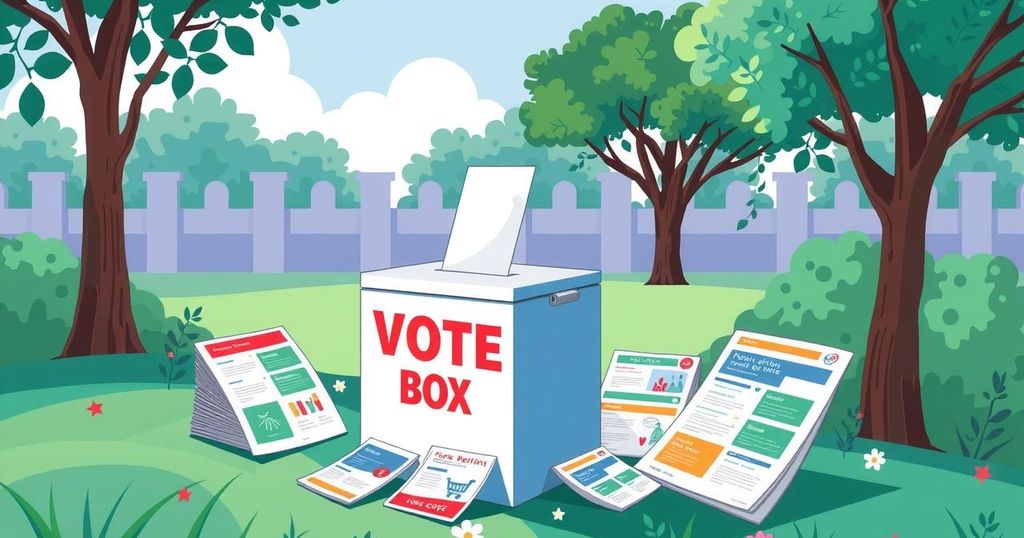Wisconsin’s High-Stakes Supreme Court Election Reflects National Political Divides

Wisconsin voters are participating in a significant state Supreme Court election, heavily influenced by national political dynamics and enormous financial contributions from significant donors, including Elon Musk. The election features Republican Brad Schimel and Democrat Susan Crawford, with implications for critical issues like abortion rights and voting laws. This election highlights concerns regarding outside influences in state contests, making it a focal point in the ongoing national political power struggle.
Wisconsin voters commenced early voting this week for a crucial state Supreme Court election, which has emerged as a reflection of the nation’s broader political conflicts. This election features substantial financial contributions from high-profile donors, prominently including billionaire Elon Musk, intensifying the stakes of the contest.
The election pits Republican candidate Brad Schimel against Democrat Susan Crawford, attracting significant national interest and funding from affluent donors on both sides. The outcome will influence the ideological makeup of the court, with impending cases concerning abortion rights, voting regulations, and immigration on the docket.
Voter sentiment reveals apprehension regarding external influences on the election. Some residents expressed worries about the court’s significant role in determining the future of abortion rights and election laws, lamenting the impact of outside capital on this pivotal judicial race.
For instance, Maggie Freespirit, a 58-year-old retired electrician, endorsed Crawford, citing her dedicated support for abortion rights. On the other hand, Steve Ravely from Waukesha, who is 72, expressed his support for Schimel rooted in his immigration and economic positions, highlighting fears over the involvement of liberal donor George Soros in state elections.
This election has shattered previous financial records, amassing an astonishing $59 million through donations, as reported by the Brennan Center for Justice. This amount surpasses the prior record for Wisconsin’s Supreme Court races, with expectations of increased spending as the election date approaches.
Elon Musk-affiliated organizations reportedly contributed over $11 million to support Schimel. Meanwhile, notable conservative figures, such as Donald Trump Jr., have engaged in rallies to mobilize Republican voter support, emphasizing the national implications of this election for Trump’s allies.
On the Democratic side, significant contributions from mega-donors like Soros and Illinois Governor J.B. Pritzker aim to empower Crawford’s campaign. Additionally, Minnesota Governor Tim Walz participated in town hall discussions in Wisconsin seeking to counteract Musk’s undue influence, while former U.S. Attorney General Eric Holder promoted early voting among Black residents in Milwaukee.
The considerable influx of funding from Musk has elicited concern among Milwaukee voters regarding its potential to skew the election results. Voter Ellen Gilligan remarked that Musk’s financial clout could “unfairly tip the scales,” while Eileen Anthony found the situation “just wrong.” The race is perceived as a referendum on Donald Trump’s political resurgence, with Crawford critiquing Schimel’s affiliation with Musk.
Schimel has publicly embraced Trump’s endorsement and aligned himself with the former president’s faction during campaign events. He attempted to mitigate fears surrounding Musk’s backing, asserting Trump’s support could broaden his appeal among infrequent voters. His presence at a recent “Mega MAGA” rally signified his alignment with prominent conservative agendas.
As the election nears its conclusion, both candidates bolster their mobilization efforts, with Musk-backed campaigns urging voters to support Schimel as a means to safeguard Trump’s agenda. By contrast, Crawford’s supporters advocate against the influence of wealthy conservative figures, framing the election as a crucial struggle for the Supreme Court’s control—and, by extension, the electoral landscape of the 2028 presidential race, making this a defining moment for both Wisconsin and national politics.
This Wisconsin Supreme Court election, marked by unprecedented financial contributions and national implications, serves as a bellwether for future political landscapes. With significant issues concerning abortion rights, voting laws, and immigration at stake, the contest reflects the deepening political divisions in the United States. The overwhelming influence of money in local elections calls for scrutiny, as both candidates engage in vigorous campaigns to sway voter turnout ahead of the pivotal decision on April 1. The outcome will not only shape Wisconsin’s judicial framework but may also have lasting effects on American politics.
Original Source: www.newsweek.com







